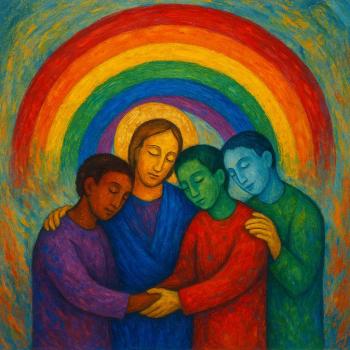If you do not like who you are, you won’t like who you are becoming.
People come to me all week to work out things that they do not like about themselves. Some of the biggest changes I see in people take months, sometimes years. Spiritual growth is a process that too takes years to attain.
Stages of Spiritual/Religious Maturity
As a pastor, I was and still am very interested in how people come into their faith and how to cultivate spiritual growth. One of the many reasons I am not a pulpit pastor now is that I forever challenged the idea of a prescribed faith or a literal interpretation of the bible.
I first received my call to ministry when I was just 17 years old, after going to confession at my local Catholic church. Being 17 and knowing it all and having my life completely planned out at that point in life, priesthood was not part of this plan. Funny how God had other plans. I had a second call while on a retreat when I was in the military and when I came home, I got in contact with my local priest who set me up with our diocese’s vocational director. For two years, working with a mentor and several representatives from the Benedictine and Redemptorist orders, I would live a largely contemplative life, very similar to what a novitiate year would look like. Then I met a pretty red head who fed me leftover tacos. She would take me on a different journey of spiritual growth.
At this time, I was also in college studying to be a social worker. My school was heavily into peace and justice issues and between this and meeting a pretty red head, I would leave the Catholic church and pursue ministry elsewhere.
One of the defining teachings for my work as a social worker and now therapist is human development. Thinkers like Piaget and Erikson shaped my understanding of how humans develop in a social environment. Thinkers like John Westerhoff and Jim Fowler shape how I think about faith development and spiritual growth. Both groups of thinkers demonstrate that life is a process of becoming and learning. Recently, Richard Rohr and Brian Mclaren have presented new ideas about faith development and spiritual growth that I feel are compatible with Fowler and Westerhoff. I am a bit critical of McLaren’s ideas because of the complexity of his theory. I think Rohr’s ideas are the most succinct.
Westerhoff – from his book, Will Our Children Have Faith, offers that there are four stages of faith: experienced faith, affiliative faith, searching faith, and owned faith. These stages are not static and are not necessarily linear. As I was a pastor during the 9/11 tragedy, we saw many people go through these stages of faith fluidly as what they believed was owned faith was in reality, lifelong experienced faith and they never moved to an owned faith. In Rohr’s words, they only had order and when they had disorder, they had no anchor point for reorder. In my opinion, the Church’s failure to explore difficult questions around this incident such as “how could God let this happen?” began the rise of the “nones” we see today.
Rohr – Richard Rohr offers what he calls the unitive way https://cac.org/daily-meditations/the-unitive-way/ ). He considers Order, Disorder, Reorder as the pattern of resilience and faith. I find this notion very simple and compelling. It also fits well with psychological notions of human development. In human development, everything is in order until it is not. Maturity then is experienced when we encounter disorder, say the tween and teenage years, and reorder our lives in a way that promotes growth through getting a job, a car, college or trade school and finally our first career. In faith development, we see the same thing. Paul even tells us that at one point, he thought as a child, but as an adult, he put childish things away. While we can still sing Jesus Loves me as an adult, we as an adult hopefully have a deeper and richer relationship with the Divine than we did when we were 5 years old.
McLaren – In 2021, in his book, Faith after Doubt: Why Your Beliefs Stopped Working and What to Do About It, Brian McLaren introduced us to these concepts of faith development: Simplicity, Complexity, Perplexity and Relativism https://brianmclaren.net/wp-content/uploads/2022/12/Four-Stages-1.pdf . Perhaps the most comprehensive look at faith development since Westerhoff and Fowler, McLaren’s four stages should be a model taught in seminaries as a modern take on faith developmental theories.
Spiritual Practices to Transform your Spiritual Growth
With the stage set then on how faith development works, I want to comment on four practices that can facilitate growth.
Wonder/ Openness
My previous post – https://www.patheos.com/blogs/loveopensdoors/2024/05/embracing-a-childlike-wonder-in-our-spiritual-practice/
In high school, I had an experience that no modern kid will ever have today, I took a World Literature class and was introduced to Buddhist and Hindu texts. Tie this with my childlike wonder and the newness of my faith and I was hooked. For almost two years after highschool, I studied Benedictine and Redemptorist spirituality. While in college, I would also study Franciscan and Jesuit spirituality and these spiritualities shaped my faith so much that it soured the opinions of me by the United Methodist board of ministry. As an adult, wonder keeps me active and the question “why?” is always at the front of my mind. I read voraciously daily.
Here are two ways to cultivate wonder in your spiritual practice:
Explore Different Traditions: Explore the wider world of other cultures and different spiritual traditions. It’s amazing how much you can learn and how it can enrich your own spiritual practice.
Read Sacred Texts: Spend time reading sacred texts or spiritual literature that resonates with you. Reflect on the teachings and how they apply to your life. I love Jewish, Buddhist, Hindu and Islamic literature. I find all these teachings offer a depth to my faith that pales to the rigid, literalistic interpretations found in Christianity.
Attention/ Being Present
My previous post: https://www.patheos.com/blogs/loveopensdoors/2023/10/aware/
We are to be instruments of peace. As a therapist, being present and attentive is a contemplative practice for me. As a parent and a spouse to an amazing woman, I carry the same attitude. Show up every day and set your intentions early. Here are some practices you can incorporate into your daily life:
Meditation and Prayer: Incorporate meditation or prayer into your daily routine. These practices can help you connect with a higher power and find inner peace.
Mindful Breathing: Take time to practice mindful breathing. Focus on your breath as it enters and leaves your body. This can help center your mind and reduce stress.
Mindful presence: turn off your cellphone, put it away and truly look at the person you are with, how they are carrying themselves, how their energy is, listen actively, make the other person feel seen and heard.
Love
Previous post: https://www.patheos.com/blogs/loveopensdoors/2024/02/clanging-cymbals-and-thrashing-gongs-thoughts-on-love/
Simply, if we do not have love, we are clanging symbols. Love is being a beneficial presence, not some gushy unrealistic feeling. Love is showing up and seeing and affirming the other person. Here are some ways to cultivate more love in your spiritual practice:
Practice Forgiveness: Work on forgiving others and yourself. Holding onto grudges can hinder spiritual growth, while forgiveness can lead to healing and liberation. The best practice here to cultivate this attitude is practicing the lovingkindness meditation: https://jackkornfield.com/meditation-on-lovingkindness/
Acts of Kindness: Engage in small acts of kindness regularly. Whether it’s helping a neighbor, volunteering, or simply offering a kind word, these actions can foster a sense of connection and purpose.
Practice Gratitude: Make it a habit to express gratitude daily. This could be through a gratitude journal where you write down things you’re thankful for, or by verbally expressing thanks to those around you. For me, I have used the tag, “have a blessed day” after each session and after leaving the presence of every person I engage with. This posture makes me feel lighter and more engaged with the other person.
Meaning/Questing
Coming full circle to development, all of life is a process of becoming. We are constantly in a stage of growth and change. The old joke goes, “people tell me to act my age, but I have never been 47 before.” Next week, I am going on a walkabout in the woods. Six days, 85 miles. Jesus did his own walkabout. The natives all over the earth used walkabouts or vision quests to cultivate deeper spiritual awareness. We can take up this practice with these practices.
Anchor points – in therapy work, we use anchor points for grounding work. Tangibles placed in your space such as pictures, words of affirmations or objects of manipulation all help bring us into the moment.
Celebrate Rituals: Plan regular celebrations to count your blessings and express your commitments. Rituals can feed the soul and provide a sense of continuity and purpose. While the internet is full of influences who tote grand practices, the spiritual practice of ritual is in itself a grounding practice that not only creates meaning but can be a daily quest as you deeply engage with your life and doing so, often learn more about yourself and your meaning in life.
Nature Connection: Spend time in nature. Whether it’s a walk in the park or a hike in the mountains, nature can be a powerful source of spiritual renewal. My dad was a nature photographer when I was growing up, he still is today. As a child, while many of our Sunday drives were boring affairs of sitting in our little Dodge Omni, they often got us out of the house and into natural areas. I came across a word the other day, fernweh which is supposed to mean an aching desire to travel that is profound that it makes you feel a sense of homesickness for a far-off place. This is often how I feel if I have not spent a couple of hours a week in natural areas. Fortunately, I live in a rural setting, so nature is not too far away.
Life is a process of becoming. Consider this deeply when told by your pastor, some religious authority on tv or well-meaning friend that you must have a belief that is rigid and binary. Most faith traditions around the world do not operate this way.












